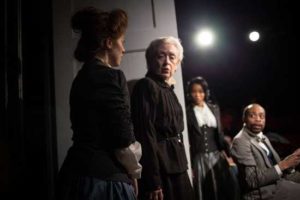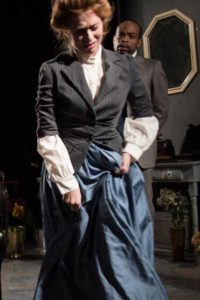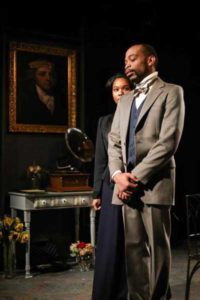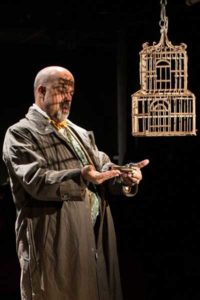
 Recommended *** Hedda Gabler is one of, if not the, most infamous characters in theatre. In a class I took on Henrik Ibsen my senior year in college, I was amused to see non-theatre majors encountering this 1890 play for the first time making comments to the effect that they couldn’t believe the author of A Doll’s House had also written such a nasty woman. And yet, Hedda has also always been one of the most beloved characters, and a great source of fun. Actresses in the nineteenth century held parades celebrating that they finally had a challenging, complex anti-hero role to play in a modern drama (August Strindberg wrote Miss Julie in 1881, but performances of it were very rare at the time). Jeff Whitty’s 2006 play The Further Adventures of Hedda Gabler imagined her in the netherworld of fictional characters on a quest to reach Ibsen’s subconscious, and Elizabeth Meriwether’s play Heddatron from the same year imagined a housewife being force to perform in the role of Hedda by robots in the Amazon. Each, along with the original, has enjoyed Chicago productions in recent years. It is, therefore, a delight to see that in his inaugural production as the new artistic director of Red Tape Theatre, that the always inventive Max Truax has directed an adaptation of Ibsen’s text by Nigel O’Hearn which makes Hedda unusually sympathetic.
Recommended *** Hedda Gabler is one of, if not the, most infamous characters in theatre. In a class I took on Henrik Ibsen my senior year in college, I was amused to see non-theatre majors encountering this 1890 play for the first time making comments to the effect that they couldn’t believe the author of A Doll’s House had also written such a nasty woman. And yet, Hedda has also always been one of the most beloved characters, and a great source of fun. Actresses in the nineteenth century held parades celebrating that they finally had a challenging, complex anti-hero role to play in a modern drama (August Strindberg wrote Miss Julie in 1881, but performances of it were very rare at the time). Jeff Whitty’s 2006 play The Further Adventures of Hedda Gabler imagined her in the netherworld of fictional characters on a quest to reach Ibsen’s subconscious, and Elizabeth Meriwether’s play Heddatron from the same year imagined a housewife being force to perform in the role of Hedda by robots in the Amazon. Each, along with the original, has enjoyed Chicago productions in recent years. It is, therefore, a delight to see that in his inaugural production as the new artistic director of Red Tape Theatre, that the always inventive Max Truax has directed an adaptation of Ibsen’s text by Nigel O’Hearn which makes Hedda unusually sympathetic.
It doesn’t seem like she will be when the play starts. Hedda (Aayisha Humphrey) spends the preshow ordering the elderly maid, Berte (Barbara Button) to rearrange the dozens of bouquets in her new house. This is the first, too, that we see of Truax’s abstract and image-laden style, which mostly takes the form of movement in this play because of the theatre’s alley-style seating arrangement. Hedda starts the play proper with a tai chi-like move, while her husband, George Tesman (Johnard Washington) enters, already apologizing without meaning anything. They talk shop—setting up a home as newlyweds involves lots of finances—with him skittering awkwardly everywhere and her scratching the wall in frustration as she realizes she’s arguing over furniture or something equally ridiculous.
Hedda married George out of desperate loneliness after she had a falling out with her bad-boy philosopher lover, Eilert Lovborg (Austin Oie), during which she pointed a pistol at him. George expects to get a university position by default due to the influence of his friend, Judge Brack (Michael Kingston), but Hedda hates what her life has become. George just seems so anodyne, and she’s not used to having to be frugal or think about her reputation if she accepts Judge Brack’s sexual advances. But then enters Thea Elvsted (Sarah Grant), a timid woman Hedda bullied as a child, who has just left her own unhappy marriage for a romance with Eilert. They fell in love while editing a new manuscript he has used to restore his reputation, and, unknowing of his past history with Hedda, Thea asks the Tesmans to befriend him and advocate for him with the university. George is livid, but Hedda is thrilled to have Eilert back in her life, and plots to not only have him to herself, but to turn him back into the unpredictable alcoholic she fell in love with.
As selfish as this is, in Truax’s staging, Hedda’s motivations are, at least, understandable. Humphrey’s Hedda is very good at being cruel—she instantly realizes that Thea distrusted her husband and makes a cutting remark—but she seems to derive no pleasure from it. Despite all Truax’s interesting stylizations, his boldest choice is the way Hedda wrestles with herself while deciding whether to return Eilert’s manuscript. She has a heart and a capacity for self-sacrifice, after all. Humphrey nails Hedda’s pride, despair, and her cowardice, for Thea is a living refutation of all Hedda’s excuses for why she lets herself be trapped in a stifling home, and therefore, Hedda must destroy her. Of great assistance to Humphrey’s performance is Washington’s as George Tesman. The character is often thought of as the epitome of ignorant mediocrity, but look in Washington’s eyes, and you’ll see a well of bitterness and wounded ego that nearly matches Hedda’s own, but is quieter. The one downside of the production, and it’s significant, is that the actors too often run out of breath before the end of their sentences. When the intended volume, cadence, and pitch of line after line is thrown off, it starts distorting the overall tone of each scene. However, I did see the show following an understudy night, and there had been no performances since before Thanksgiving, so it’s probable I caught the cast at their weakest.
It’s ironic that Ibsen’s name became synonymous with realism in the earliest twentieth century, because most of his plays aren’t realistic, but the best-known ones are. To a person who is used to thinking of Ibsen as a writer primarily concerned with the clash between our responsibility to society and our responsibility to ourselves, or to a person who has no preconceived ideas about Ibsen at all (theatre people often forget that Hedda Gabler is only famous to us), a heavily stylized and streamlined adaptation seems like a reasonable experiment. To a person who is used to thinking of Ibsen as an interrogator of nineteenth-century middle-class conventional Norwegian morality, this entire concept could prove jarring. As usual, the design team, including costumer Izumi Inaba, properties master Abigail Cain, set designer Joanna Iwanicka, and sound designer Steve Labedz, make a lot out of very little, and the small space of the alley stage contributes to Hedda’s claustrophobia. O’Hearn’s adaptation is billed as telling the story from Hedda’s point of view, and so it does. If you ever wondered whether it was possible to feel anything for her, this play could surprise you.
A Hedda Gabler will run thru December 17th at The Buena space in the Pride Arts Center at 4147 N Broadway, Chicago.
Running time is one hundred and five minutes with no intermission.
Performances are
Thursday: 8:00 pm
Friday: 8:00 pm
Saturdays: 8:00 pm
Tickets are $20. Visit RedTapeTheatre.org to order. Street parking is available.
To see what others are saying, visit www.theatreinchicago.com, go to Review Round-Up and click “Hedda Gabler.”







More Stories
“Dummy in Diaspora”
“The Magic School Bus: Lost in the Solar System”
“February House” reviewed by Julia W. Rath